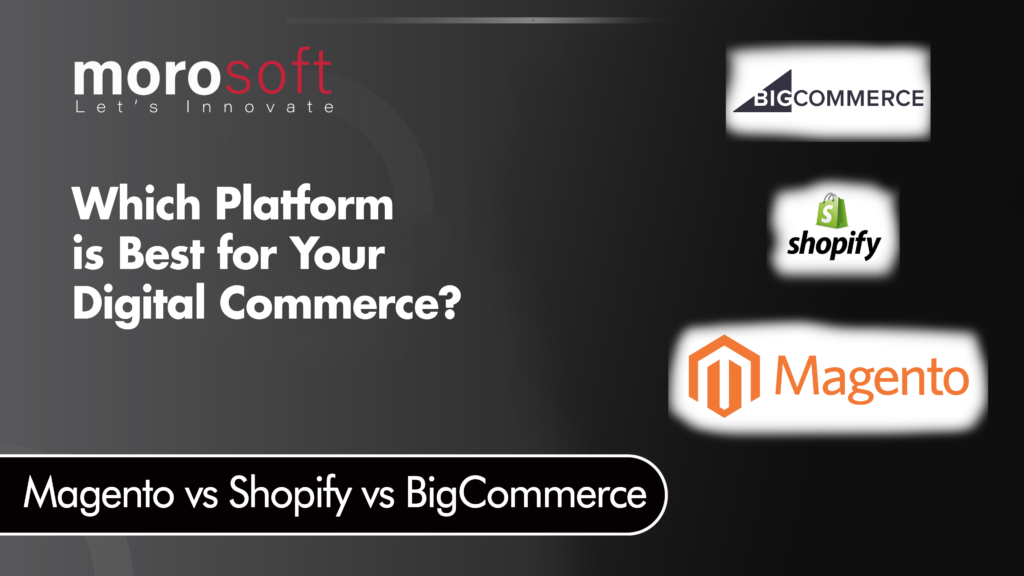In the world of digital commerce, choosing the right platform can make or break your business. With so many options available, it can be overwhelming to select the one that fits your specific needs. Among the most popular platforms are Magento, Shopify, and BigCommerce—each offering unique features and benefits.
In this blog, we’ll dive deep into a comparison of these three giants to help you make an informed decision for your eCommerce business.
1. Overview of Each Platform
Magento
Magento is an open-source platform known for its high level of customization and scalability. It’s a powerful solution for medium to large businesses that need flexibility to create a tailored shopping experience. However, the platform can be complex, requiring technical expertise to fully take advantage of its capabilities.
Shopify
Shopify is a hosted platform that focuses on ease of use, making it perfect for entrepreneurs and small to medium-sized businesses. Its intuitive interface and extensive app store allow for quick setup and easy scaling, even for those without technical knowledge.
BigCommerce
BigCommerce, like Shopify, is a hosted platform but offers more built-in features out of the box. It’s an excellent option for businesses looking for a robust, all-in-one solution without needing too many third-party apps.
2. Ease of Use
Magento
Magento is feature-rich, but it’s not the easiest platform to navigate, especially for beginners. The platform is designed for developers and businesses that require a high level of customization. It has a steep learning curve, and most users will need a developer or technical team to manage the setup and maintenance.
Shopify
Shopify shines in ease of use. Its drag-and-drop interface allows even non-technical users to build a professional-looking store quickly. Shopify handles all the hosting and security concerns, so users can focus more on growing their business rather than maintaining the platform.
BigCommerce
BigCommerce strikes a balance between ease of use and advanced features. While it’s not as beginner-friendly as Shopify, it’s easier to manage than Magento. BigCommerce’s dashboard is clean and intuitive, making it a good option for users who want a powerful platform without the complexity of Magento.
3. Customization and Flexibility
Magento
Magento is known for its unmatched flexibility. As an open-source platform, it allows developers to modify virtually any aspect of the store, from design to functionality. This makes it an ideal choice for large businesses with complex needs. However, to unlock its full potential, you’ll need a skilled development team.
Shopify
Shopify offers customization through its extensive theme store and app marketplace. However, since it’s a hosted platform, there are some limitations to what you can change. Customization beyond what’s provided by Shopify themes and apps may require coding skills, but it’s much more restrictive compared to Magento.
BigCommerce
BigCommerce offers more built-in customization options than Shopify without needing apps. However, like Shopify, it has certain limitations since it’s a hosted platform. You can customize your store through themes and apps, but the level of flexibility is somewhat limited compared to Magento.
4. Scalability
Magento
Magento is the king of scalability. It’s built for businesses looking to grow significantly, handling thousands of products and large volumes of traffic with ease. However, as your store grows, you’ll need more server resources, meaning higher costs and more complex maintenance. But for enterprise-level businesses, it’s an excellent option.
Shopify
Shopify is ideal for small to medium-sized businesses that are looking to grow without the hassle of managing the technical aspects of a website. Shopify also offers Shopify Plus, an enterprise solution designed for larger businesses, providing more robust features while keeping the platform easy to use.
BigCommerce
BigCommerce is built to scale with your business, offering excellent support for large product catalogs and high traffic. It’s a suitable platform for businesses of all sizes, providing advanced features without requiring extensive development resources.
5. SEO and Marketing Tools
Magento
Magento offers advanced SEO features out of the box. You can customize your URLs, meta tags, and product descriptions, and it’s known for being highly SEO-friendly. Magento’s flexibility also allows developers to implement custom SEO strategies and integrate third-party tools for analytics and marketing.
Shopify
Shopify offers solid SEO features, though somewhat more basic compared to Magento. Shopify automatically generates sitemaps and allows for customization of meta titles and descriptions. Shopify’s integration with Google Analytics and other marketing tools is seamless, and there are plenty of apps to extend your marketing efforts.
BigCommerce
BigCommerce is one of the most SEO-friendly platforms, offering features such as editable page URLs, meta tags, and optimized sitemaps. It also includes robust marketing tools, such as promotions, coupon management, and cart abandonment recovery, without needing third-party apps.
6. Pricing
Magento
Magento is free in its open-source version, but there are additional costs for hosting, extensions, and development. Magento also offers an Enterprise version, which comes with a high price tag but offers advanced features for large-scale businesses. The costs for maintaining a Magento store can add up, especially as you scale.
Shopify
Shopify has a clear, tiered pricing structure starting at $29/month for the basic plan. While you’ll need to pay for apps and themes, Shopify handles hosting and security, which is included in the monthly fee. Shopify also offers Shopify Plus, starting at $2,000/month, for enterprise-level solutions.
BigCommerce
BigCommerce pricing starts at $29.95/month, similar to Shopify. The main difference is that BigCommerce includes more advanced features in its standard package, which could save money on apps and third-party tools. BigCommerce’s enterprise-level pricing is based on your business’s specific needs, making it flexible for larger companies.
7. Support and Community
Magento
Magento has a large community of developers and plenty of resources available online. However, direct support from Magento requires a paid subscription, which can be costly for smaller businesses.
Shopify
Shopify provides 24/7 customer support via chat, email, and phone. The platform also has a large community forum, extensive documentation, and numerous tutorials to help users get the most out of their store.
BigCommerce
BigCommerce offers 24/7 support through chat, email, and phone. The platform also has a robust knowledge base and community support, although its community is not as large as Magento’s.
Conclusion: Which Platform is Right for You?
- Choose Magento if you’re a large, enterprise-level business needing maximum control, flexibility, and scalability. However, you’ll need a skilled development team to handle its complexity.
- Choose Shopify if you’re a small to medium-sized business looking for ease of use, quick setup, and reliable hosting. Shopify is great for those who don’t have technical skills but want to scale their store with ease.
- Choose BigCommerce if you want more out-of-the-box features without the need for extensive app add-ons, and you’re looking for a powerful platform that can scale with your business. BigCommerce offers a nice middle ground between Shopify’s simplicity and Magento’s flexibility.
Each platform offers its own set of benefits, so the choice ultimately depends on your business size, technical expertise, and long-term goals. Whether you prioritize ease of use, customization, or scalability, there’s a platform to suit your needs.




